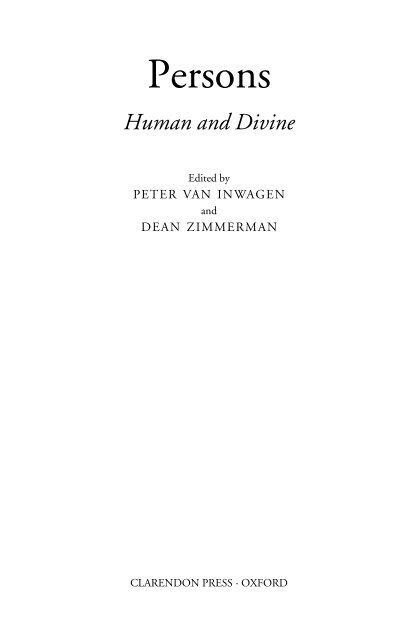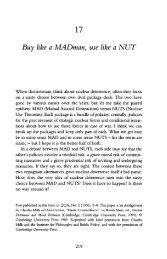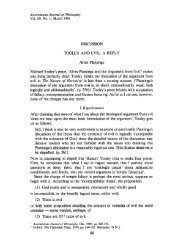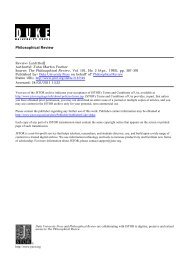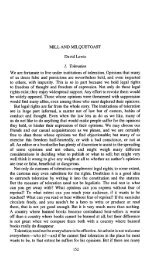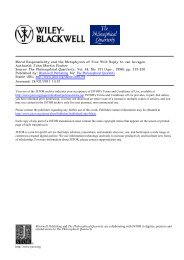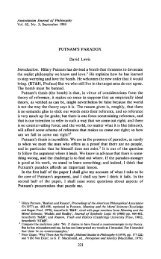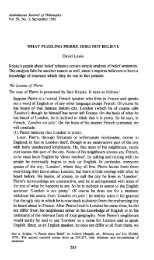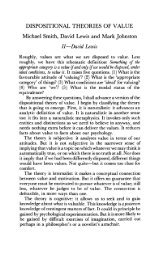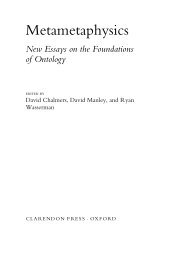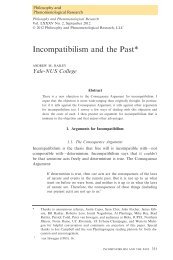A Materialist Ontology of the Human Person - Andrew M. Bailey
A Materialist Ontology of the Human Person - Andrew M. Bailey
A Materialist Ontology of the Human Person - Andrew M. Bailey
You also want an ePaper? Increase the reach of your titles
YUMPU automatically turns print PDFs into web optimized ePapers that Google loves.
<strong>Person</strong>s<br />
<strong>Human</strong> and Divine<br />
Edited by<br />
PETER VAN INWAGEN<br />
and<br />
DEAN ZIMMERMAN<br />
CLARENDON PRESS · OXFORD
1<br />
Great Clarendon Street, Oxford OX2 6DP<br />
Oxford University Press is a department <strong>of</strong> <strong>the</strong> University <strong>of</strong> Oxford.<br />
It fur<strong>the</strong>rs <strong>the</strong> University’s objective <strong>of</strong> excellence in research, scholarship,<br />
and education by publishing worldwide in<br />
Oxford New York<br />
Auckland Cape Town Dar es Salaam Hong Kong Karachi<br />
Kuala Lumpur Madrid Melbourne Mexico City Nairobi<br />
New Delhi Shanghai Taipei Toronto<br />
With <strong>of</strong>fices in<br />
Argentina Austria Brazil Chile Czech Republic France Greece<br />
Guatemala Hungary Italy Japan Poland Portugal Singapore<br />
South Korea Switzerland Thailand Turkey Ukraine Vietnam<br />
Oxford is a registered trade mark <strong>of</strong> Oxford University Press<br />
in <strong>the</strong> UK and in certain o<strong>the</strong>r countries<br />
Published in <strong>the</strong> United States<br />
by Oxford University Press Inc., New York<br />
© <strong>the</strong> several contributors 2007<br />
The moral rights <strong>of</strong> <strong>the</strong> authors have been asserted<br />
Database right Oxford University Press (maker)<br />
First published 2007<br />
All rights reserved. No part <strong>of</strong> this publication may be reproduced,<br />
stored in a retrieval system, or transmitted, in any form or by any means,<br />
without <strong>the</strong> prior permission in writing <strong>of</strong> Oxford University Press,<br />
or as expressly permitted by law, or under terms agreed with <strong>the</strong> appropriate<br />
reprographics rights organization. Enquiries concerning reproduction<br />
outside <strong>the</strong> scope <strong>of</strong> <strong>the</strong> above should be sent to <strong>the</strong> Rights Department,<br />
Oxford University Press, at <strong>the</strong> address above<br />
You must not circulate this book in any o<strong>the</strong>r binding or cover<br />
and you must impose <strong>the</strong> same condition on any acquirer<br />
British Library Cataloguing in Publication Data<br />
Data available<br />
Library <strong>of</strong> Congress Cataloging in Publication Data<br />
Data available<br />
Typeset by Laserwords Private Limited, Chennai, India<br />
Printed in Great Britain<br />
on acid-free paper by<br />
Biddles Ltd, King’s Lynn, Norfolk<br />
ISBN 978–0–19–927750–6<br />
ISBN 978–0–19–927751–3 (Pbk.)<br />
1 3 5 7 9 10 8 6 4 2
8<br />
A <strong>Materialist</strong> <strong>Ontology</strong> <strong>of</strong> <strong>the</strong> <strong>Human</strong> <strong>Person</strong><br />
Peter van Inwagen<br />
Iwillbeginbysettingoutametaphysicalpositionthatissoabstractthatithardly<br />
deserves <strong>the</strong> name ‘position’. (Perhaps it would be better called a ‘metaphysical<br />
framework’.) This very abstract position constitutes <strong>the</strong> metaphysical perspective<br />
from which I view all philosophical problems, including those problems that<br />
pertain to <strong>the</strong> human person. If you think this perspective is skewed, you will<br />
not find much to agree with in what I am going to say about <strong>the</strong> ontology <strong>of</strong> <strong>the</strong><br />
human person.<br />
The most general metaphysical category is <strong>the</strong> category ‘‘thing’’. I use ‘thing’<br />
as <strong>the</strong> most general count-noun. Everything is a thing. A thing is anything that<br />
can be referred to by a third-person-singular pronoun—as when I say, ‘‘The<br />
following is true <strong>of</strong> everything, that it is identical with itself.’’ The category<br />
‘‘thing’’ comprises everything <strong>the</strong>re is, everything that exists (for I take a stern<br />
anti-Meinongian line about non-existents: non-existents simply don’t exist: <strong>the</strong><br />
number <strong>of</strong> <strong>the</strong>m is 0).<br />
Things divide into two sub-categories, <strong>the</strong> concrete and <strong>the</strong> abstract. If <strong>the</strong>re<br />
are such things as <strong>the</strong> following, <strong>the</strong>y are concrete: cabbages, kings, bits <strong>of</strong> sealing<br />
wax, electrons, tables and chairs, angels, ghosts, and God. I myself believe in<br />
only some <strong>of</strong> <strong>the</strong> things in this list: cabbages, kings, electrons, angels, and God.<br />
But I am quite certain that if <strong>the</strong>re were bits <strong>of</strong> sealing wax, tables and chairs,<br />
and ghosts, <strong>the</strong>y would be concrete things. Here is a list <strong>of</strong> abstract things:<br />
propositions, possibilities, sentence-types, sets, properties or attributes, numbers,<br />
novels (as opposed to tangible copies <strong>of</strong> novels), <strong>the</strong>ories, and such miscellaneous<br />
items as <strong>the</strong> key <strong>of</strong> F-sharp minor, democracy, and <strong>the</strong> literary form <strong>the</strong> epic<br />
poem.Iamnotsurewhich<strong>of</strong><strong>the</strong>thingsinthislistIbelievereallyexist(Icertainly<br />
think some <strong>of</strong> <strong>the</strong>m do), but I am quite certain that if <strong>the</strong>re is such a thing as, for<br />
example, <strong>the</strong> key <strong>of</strong> F-sharp minor, it is an abstract thing.<br />
How can we understand this distinction? (That is to say, how can we provide an<br />
explicit statement <strong>of</strong> <strong>the</strong> distinction marked by <strong>the</strong> words ‘abstract’ and ‘concrete’,<br />
for, in my view, it is a real distinction and one we can grasp simply by attending<br />
to lists <strong>of</strong> examples. Some philosophers, <strong>of</strong> course, doubt whe<strong>the</strong>r <strong>the</strong>re are any<br />
clear ideas associated with <strong>the</strong> words ‘abstract’ and ‘concrete’.) Can we provide
200 Peter van Inwagen<br />
ausefuldefinition<strong>of</strong>ei<strong>the</strong>r‘abstract’or‘concrete’?(Ifwecoulddefineei<strong>the</strong>r,<br />
we could define <strong>the</strong> o<strong>the</strong>r as its complement.) Well, I’m inclined to think that<br />
if someone says, ‘‘A thing is concrete if and only if it has causal powers’’, that<br />
person says something true. But I’m not satisfied that this counts as a definition.<br />
One reason, <strong>of</strong> course, is that <strong>the</strong> concept ‘‘causal powers’’ needs a good deal<br />
<strong>of</strong> philosophical work. But I see, or think I see, a deeper difficulty: it seems to<br />
me that although concrete objects, one and all, have causal powers, and abstract<br />
objects, one and all, lack causal powers, this is a fact that an adequate definition <strong>of</strong><br />
‘concrete’ and ‘abstract’ ought to explain.Todefineaconcreteobjectasanobject<br />
that has causal powers seems to me, at least in some moods, to be like defining<br />
a‘‘word’’asathingthatcanbespelledcorrectlyorincorrectly.Thisdefinition<br />
<strong>of</strong> ‘word’ does, I suppose, give ‘word’ <strong>the</strong> right extension, but one feels that it<br />
touches on a ra<strong>the</strong>r peripheral feature <strong>of</strong> words: a definition <strong>of</strong> ‘word’ should be<br />
such as to explain why words and words alone are things that have spellings. I am<br />
<strong>the</strong>refore not going to <strong>of</strong>fer ‘has causal powers’ as a definition <strong>of</strong> ‘concrete’ object,<br />
for I feel somehow that <strong>the</strong> no-doubt-true statement ‘A thing is concrete if and<br />
only if it has causal powers’ doesn’t get at <strong>the</strong> essence <strong>of</strong> what it is to be a concrete<br />
object; I think we are able to grasp this essence by considering any reasonably<br />
comprehensive list <strong>of</strong> types <strong>of</strong> concrete object and proceeding to perform some<br />
sort <strong>of</strong> act <strong>of</strong> abstraction that enables us to see what <strong>the</strong> common feature <strong>of</strong> things<br />
in <strong>the</strong> list is. But I doubt whe<strong>the</strong>r we are able to articulate <strong>the</strong> essence we grasp in<br />
this act <strong>of</strong> abstraction. And here is a perhaps related problem that faces us if we<br />
understand ‘abstract object’ as ‘object that has no causal powers’. This definition<br />
is purely negative: it represents <strong>the</strong> concept ‘‘abstract object’’ as <strong>the</strong> concept <strong>of</strong> a<br />
kind <strong>of</strong> thing that does not have a certain property and tells us absolutely nothing<br />
about what properties <strong>the</strong>se things do have—beyond, <strong>of</strong> course, <strong>the</strong> property not<br />
having causal powers and its logical consequences. Suppose it had never occurred<br />
to anyone that phrases like those in my list <strong>of</strong> examples <strong>of</strong> abstract objects were<br />
denoting phrases. If some philosopher were to introduce <strong>the</strong> concept ‘‘thing<br />
lacking causal powers’’ into some metaphysical discussion, that would probably<br />
suggest to his audience that he had in mind some ghostly sort <strong>of</strong> thing that could<br />
drift about in space and pass through material objects without affecting <strong>the</strong>m or<br />
being affected by <strong>the</strong>m. No one, surely, would react by saying anything like, ‘‘If<br />
<strong>the</strong>re were objects that had no causal powers, that could only be because words<br />
and phrases like ‘wisdom’ or ‘<strong>the</strong> proposition that snow is white’ had referents;<br />
objects without causal powers would be <strong>the</strong> referents <strong>of</strong> phrases like that.’’ It<br />
seems, <strong>the</strong>refore, that one could have <strong>the</strong> purely negative concept ‘‘having no<br />
causal powers’’ without having <strong>the</strong> concept ‘‘abstract object’’.<br />
Now <strong>the</strong> metaphysical position or framework I promised you. First, <strong>the</strong>re<br />
is only one kind <strong>of</strong> concrete object: that which has traditionally been called<br />
‘‘substance’’ or ‘‘individual thing’’. And <strong>the</strong>re is only one type <strong>of</strong> abstract object.<br />
Iwillcallthisonetype‘‘relation’’.Iwillfirstexpandonthissecondstatement.<br />
Among relations <strong>the</strong>re are 0-term relations, or propositions, 1-term relations
A<strong>Materialist</strong><strong>Ontology</strong><strong>of</strong><strong>the</strong><strong>Human</strong><strong>Person</strong> 201<br />
(also called properties, attributes, qualities, features, characteristics ...), and<br />
2-or-more-term relations, which I will call ‘proper relations’ (on <strong>the</strong> model <strong>of</strong><br />
proper fractions and proper subsets). I will not discuss proper relations. I will,<br />
however, say something about propositions and properties. Propositions are<br />
things that have truth-values. They are things that can be said —that is, asserted.<br />
They are things that can be assented to or denied. (For most propositions, <strong>the</strong>se<br />
descriptions are true only in principle, at least as regards human beings. Most<br />
propositions are too complicated to be assented to or denied by any human being.<br />
The same ‘‘true only in principle’’ qualification will be needed at various points<br />
in <strong>the</strong> sequel. I’ll leave it you to supply it.) Properties, by contrast, are things<br />
that can be said <strong>of</strong> or about something (whe<strong>the</strong>r truly or falsely); that it is white,<br />
for example. That it is white is one <strong>of</strong> <strong>the</strong> things you can say truly <strong>of</strong> <strong>the</strong> White<br />
House, and you can say it truly <strong>of</strong> <strong>the</strong> Taj Mahal, too. But you can’t say it truly <strong>of</strong><br />
<strong>the</strong> Eiffel Tower or <strong>the</strong> key <strong>of</strong> F-sharp minor; you can, in fact, say it only falsely <strong>of</strong><br />
<strong>the</strong>se objects, for each is non-white. A few properties have traditional names that<br />
are, as <strong>the</strong> linguists say, perfect nominals: ‘whiteness’, for example, or ‘wisdom’.<br />
In my view, ‘wisdom’ is a name for what we say <strong>of</strong> or about Solomon and <strong>the</strong><br />
Cumaean Sibyl when, speaking with reference to <strong>the</strong>m, we say, as appropriate,<br />
‘He is wise’ or ‘She is wise’. But most properties have no such names: one <strong>of</strong> <strong>the</strong><br />
things we can say <strong>of</strong> something is that it is one <strong>of</strong> <strong>the</strong> daughters <strong>of</strong> <strong>the</strong> forty-third<br />
President (we could say this truly <strong>of</strong> exactly two things; if we said it <strong>of</strong> Chelsea<br />
Clinton or <strong>the</strong> Eiffel Tower or <strong>the</strong> number <strong>of</strong> planets, we’d be saying it falsely <strong>of</strong><br />
those things). And this property, a perfectly good example <strong>of</strong> a property in my<br />
view, has no one-word name. Typical properties (and, more generally, typical<br />
relations) are, as ‘whiteness’ and ‘wisdom’ and our more complicated example<br />
testify, universals, for, typically, a property can be said truly <strong>of</strong>—or, to use some<br />
more usual idioms, can belong to, be had by, be instantiated by, be exemplified<br />
by—two or more things. Not all properties have this feature, however, for <strong>the</strong>re<br />
are plenty <strong>of</strong> things that can be said truly <strong>of</strong> only one thing (that it is a daughter<br />
<strong>of</strong> <strong>the</strong> forty-second president; that it is an even prime), and plenty that cannot be<br />
said truly <strong>of</strong> even one thing (that it is a woman who served as President <strong>of</strong> <strong>the</strong> U.S.<br />
in <strong>the</strong> twentieth century; that it is both round and square). I thus come down on<br />
<strong>the</strong> side <strong>of</strong> platonism, as opposed both to nominalism and Aristotelianism. And<br />
averycapaciousplatonismitis.I’dlike to say that to every meaningful open<br />
sentence <strong>the</strong>re corresponds a property, but you probably know why I can’t say<br />
that. I have to admit that Russell’s paradox forces me to confront a mystery: it<br />
seems that one <strong>of</strong> <strong>the</strong> things you can say about something is that it is a thing <strong>of</strong><br />
<strong>the</strong> sort that can be said <strong>of</strong> things and can’t be said truly <strong>of</strong> itself. Butitcan’tbe<br />
that <strong>the</strong>re is any such thing to say about things, despite <strong>the</strong> fact that one can say<br />
truly <strong>of</strong> wisdom that you can’t say it truly <strong>of</strong> itself, and can say truly <strong>of</strong> whiteness<br />
that you can’t say it truly <strong>of</strong> itself. And that certainly looks for all <strong>the</strong> world like<br />
acaseinwhichoneand<strong>the</strong>samethingcanbesaidtrulyboth<strong>of</strong>wisdomand<strong>of</strong><br />
whiteness. Well, I’m a metaphysician and am inured to mystery.
202 Peter van Inwagen<br />
It should be evident that properties, as I use <strong>the</strong> term, are as abstract as anything<br />
could be. They can in no way be ‘‘constituents’’ (whatever that might mean) <strong>of</strong><br />
concrete objects. If <strong>the</strong>re are such things as ‘‘tropes’’ or ‘‘immanent universals’’,<br />
<strong>the</strong>y are not properties or any o<strong>the</strong>r sort <strong>of</strong> relation. And, since, in my view, <strong>the</strong>re<br />
are only substances and relations, <strong>the</strong>re are no tropes or immanent universals. I<br />
don’t mind this consequence, for, as far as I can see, <strong>the</strong> term ‘trope’ (as used<br />
by philosophers), and <strong>the</strong> term ‘immanent universal’ are perfectly meaningless.<br />
Ano<strong>the</strong>r perfectly meaningless term—this one over on <strong>the</strong> ‘‘concrete’’ side <strong>of</strong><br />
things—would be ‘bare particular’. A bare particular would ei<strong>the</strong>r be what you<br />
get when you subtract <strong>the</strong> tropes from an ordinary concrete object (and thus<br />
<strong>the</strong> term would be meaningless) or else a thing <strong>of</strong> which nothing is true; and <strong>of</strong><br />
course, <strong>the</strong> idea <strong>of</strong> a thing <strong>of</strong> which nothing is true makes no sense at all.<br />
One final point about propositions and properties and o<strong>the</strong>r abstract objects.<br />
They are not among <strong>the</strong> invisibilia that are mentioned in <strong>the</strong> Nicene Creed.<br />
With <strong>the</strong> possible exception <strong>of</strong> those abstract objects that in some way ‘‘involve’’<br />
concrete objects (such as ‘‘impure’’ sets and, perhaps, propositions that predicate<br />
properties <strong>of</strong> particular individuals), <strong>the</strong>y are eternal and necessary and hence<br />
uncreated. The invisibilia that we Christians must not believe to be uncreated are<br />
those ‘‘unseen’’ things that have causal powers. (As far as we know, all <strong>the</strong>se things<br />
are persons, and, more specifically, angels <strong>of</strong> some sort. If <strong>the</strong>re are impersonal<br />
invisibilia, we have not been told about <strong>the</strong>m.) Those who want to say that <strong>the</strong><br />
doctrine <strong>of</strong> God’s sovereignty implies that he must somehow be <strong>the</strong> creator <strong>of</strong><br />
such things as <strong>the</strong> proposition that snow is white are, to borrow words Whitehead<br />
used for ano<strong>the</strong>r purpose, paying God an ill-judged metaphysical compliment.<br />
I should like to be able to say something useful about substances or individual<br />
things. But I can’t, not really. Of course it follows from what I have said that<br />
substances have causal powers and that anything that has causal powers is a<br />
substance. But this statement will not be <strong>of</strong> much help to anyone who wants<br />
to know what a substance is. You might <strong>of</strong> course want to dispute even this<br />
unhelpful statement. You may think that <strong>the</strong>re are things that have causal powers<br />
but shouldn’t be called substances. If you do, I’ll have to ask you what <strong>the</strong>y might<br />
be. Tropes? There are no such things. Surfaces? There are no such things. States?<br />
Ei<strong>the</strong>r <strong>the</strong>re are no such things or <strong>the</strong>y are some sort <strong>of</strong> property and thus lack<br />
causal powers. Social entities like baseball teams and corporations? I don’t know<br />
what to say about <strong>the</strong>m, o<strong>the</strong>r than to remind you that hard cases make bad law.<br />
(I don’t mean that I can’t think <strong>of</strong> any way to fit social entities into my ontological<br />
framework; I mean I can think <strong>of</strong> lots <strong>of</strong> ways to fit <strong>the</strong>m in, and am not sure<br />
which is <strong>the</strong> best.) Stuffs? Well, stuffs are worthy <strong>of</strong> discussion, but such discussion<br />
wouldn’t be germane to what I’m going to talk about. Let’s just say that if some<br />
metaphysician convinced me that I had to add stuffs to my ontology, <strong>the</strong> addition<br />
wouldn’t affect anything I’m going to say. Events? Ah, that’s a very good question.<br />
Events constitute one <strong>of</strong> <strong>the</strong> main challenges to <strong>the</strong> adequacy <strong>of</strong> my ontological<br />
framework. Our discourse obviously contains many sentences that on some
A<strong>Materialist</strong><strong>Ontology</strong><strong>of</strong><strong>the</strong><strong>Human</strong><strong>Person</strong> 203<br />
understanding or analysis must express truths and which apparently refer to and<br />
quantify over events. I must somehow take account <strong>of</strong> this fact, and, it would<br />
seem, in one <strong>of</strong> four ways. (1) I might try to show that all true statements that<br />
apparently imply <strong>the</strong> existence <strong>of</strong> events can be paraphrased as statements solely<br />
about <strong>the</strong> changing properties <strong>of</strong> and changing relations among substances; (2) I<br />
might try to show that events can be understood as substances (<strong>of</strong> some special<br />
sort); (3) I might try to show that events can be understood as properties (<strong>of</strong><br />
some special sort; (4) I might concede that my ontological framework needs to<br />
be expanded and say that <strong>the</strong>re are two sorts <strong>of</strong> concrete object, substances and<br />
events; (5) I might concede that my ontological framework needs to be expanded<br />
and say that <strong>the</strong>re are two sorts <strong>of</strong> abstract object, properties and events. I am not<br />
at present clear which <strong>of</strong> <strong>the</strong>se options I should choose, or even which <strong>of</strong> <strong>the</strong>m<br />
is <strong>the</strong> most promising. I hope that I shall one day be able to ‘‘paraphrase events<br />
away’’ (option 1), but I admit that I have not yet given any serious thought to<br />
this project. And I am certain that option 2 is a non-starter (I have included it<br />
in <strong>the</strong> list <strong>of</strong> options only for <strong>the</strong> sake <strong>of</strong> logical completeness). Beyond this, I<br />
am forced to admit that I do not know what to say about events. I wish I did,<br />
because, while I was writing this essay, I discovered that an important question<br />
in <strong>the</strong> philosophy <strong>of</strong> mind turns on <strong>the</strong> question whe<strong>the</strong>r <strong>the</strong>re are events. Not<br />
an absolutely fundamental question, but one <strong>of</strong> some significance. In this paper,<br />
I’ll have to content myself with saying what this important question in <strong>the</strong><br />
philosophy <strong>of</strong> mind that turns on <strong>the</strong> question whe<strong>the</strong>r <strong>the</strong>re are events is. This<br />
IwilldowhenIdiscuss<strong>the</strong>identity<strong>the</strong>ory.<br />
An incidental remark: <strong>the</strong> fact that I am not sure what to make <strong>of</strong> events<br />
has ano<strong>the</strong>r consequence, a purely metaphysical one. Because <strong>of</strong> my uncertainty<br />
about <strong>the</strong> existence and nature <strong>of</strong> events, I cannot follow Aristotle and define a<br />
substance as a thing that has properties but is not itself a property—for events,<br />
if such <strong>the</strong>re be, may have properties and yet not <strong>the</strong>mselves be properties. (The<br />
same point, <strong>of</strong> course, could be made in relation to stuffs.)<br />
Here ends my description <strong>of</strong> <strong>the</strong> metaphysical framework that underlies my<br />
discussion <strong>of</strong> <strong>the</strong> philosophy <strong>of</strong> mind. Let’s now turn to you and me, to us<br />
human persons. How do we fit into this framework? Well, obviously, we’re<br />
not relations. True, some philosophers seem to think we’re something like a<br />
computer program, and a computer program, in my metaphysic, is probably<br />
some sort <strong>of</strong> relation. But I have a hard time believing this is really what <strong>the</strong>se<br />
philosophers mean to say, and if <strong>the</strong>y do mean to say this we can ignore <strong>the</strong>m.<br />
Whatever I am, I’m a lot more like a poached egg or a waterfall or a hydraulic<br />
jack than I am like a computer program; one should <strong>the</strong>refore take <strong>the</strong> <strong>the</strong>sis that<br />
I’m a computer program less seriously than one would take <strong>the</strong> <strong>the</strong>sis that I’m a<br />
poached egg, and that’s not very seriously.<br />
If we exist at all, we’re substances. Now some philosophers think we don’t<br />
exist at all. Perhaps it suffices to point out that if <strong>the</strong>y’re right, <strong>the</strong>n it’s false<br />
that some philosophers think we don’t exist at all. Their <strong>the</strong>sis is thus ei<strong>the</strong>r false
204 Peter van Inwagen<br />
or such that no one holds it. And I’m not going to waste my time and yours<br />
discussing a <strong>the</strong>sis that’s ei<strong>the</strong>r false or held by no one.<br />
Perhaps this is as good a point as any at which to mention <strong>the</strong> ‘‘self’’. (There<br />
isn’t any very good point.) Some philosophers say things like this: that modern<br />
neurobiology has exploded <strong>the</strong> old myth <strong>of</strong> <strong>the</strong> self or that <strong>the</strong> self is a social<br />
construct or that Descartes was mistaken in thinking that a sharp boundary could<br />
be drawn between self and world. When I hear philosophers say things like this,<br />
<strong>the</strong> first thing I always ask <strong>the</strong>m is whe<strong>the</strong>r, when I use <strong>the</strong> word ‘I’ I refer, or at<br />
least am attempting to refer, to one <strong>of</strong> <strong>the</strong> <strong>the</strong>se ‘‘selves’’ (my own, <strong>of</strong> course).<br />
After all, if <strong>the</strong>re are selves and if, when I use <strong>the</strong> word ‘I’ I refer to something, it<br />
would seem that it must be my Self I refer to. Or if <strong>the</strong>re is such a thing as my<br />
Self, and I do not refer to it when I use <strong>the</strong> word ‘I’, how could it be correct to<br />
call this thing my Self? It is not I, it is ra<strong>the</strong>r something numerically distinct from<br />
me, and how can something that is not I be properly called my Self? Or, if <strong>the</strong><br />
philosophers I am talking to are <strong>of</strong> <strong>the</strong> party that holds that selves are myths, I<br />
ask <strong>the</strong>m whe<strong>the</strong>r <strong>the</strong>ir position is that <strong>the</strong>y do not exist—for if <strong>the</strong>y exist, <strong>the</strong>n,<br />
<strong>of</strong> course, each time one <strong>of</strong> <strong>the</strong>m uses <strong>the</strong> word ‘I’, that use refers to something,<br />
and what could that referent be but <strong>the</strong> self <strong>of</strong> <strong>the</strong> speaker? These questions may<br />
seem to some to be trivial quibbles on my part, but <strong>the</strong>y are no such thing. They<br />
confront <strong>the</strong> philosophers who talk <strong>of</strong> selves with a dilemma I have never seen<br />
satisfactorily resolved. If <strong>the</strong>y say, ‘‘Yes, that’s just what your Self is (or that’s just<br />
what it would be if <strong>the</strong>re were such a thing): what you refer to when you say ‘I’,’’<br />
<strong>the</strong>n <strong>the</strong>ir <strong>the</strong>ses almost invariably turn out to be nonsense or obviously false or<br />
so obviously true that it is hard to think why anyone would bo<strong>the</strong>r stating <strong>the</strong>m.<br />
(Modern neurobiology has obviously not shown that <strong>the</strong>re are no such things as<br />
you and I.) Or, if <strong>the</strong>y say, ‘‘No, that’s not what your Self is—your Self is not<br />
you but something numerically distinct from you; it is [or ‘is supposed to be’]<br />
something you have; it’snotwhatyouare,’’ <strong>the</strong>n <strong>the</strong>y are never able to give any<br />
real explanation <strong>of</strong> what <strong>the</strong>y mean by ‘self’: <strong>the</strong>ir attempts at explanation turn<br />
out to be so much semantical arm-waving. Let this suffice for a discussion <strong>of</strong> <strong>the</strong><br />
‘‘self’’.<br />
We are, I contend, substances. What sort <strong>of</strong> substances? Well, ei<strong>the</strong>r material or<br />
immaterial substances. (Grave difficulties confront <strong>the</strong> philosopher who proposes<br />
to define ‘material’ and immaterial’. In this essay, I will ignore <strong>the</strong>se problems.)<br />
Or so it would seem. But <strong>the</strong>re is a sort <strong>of</strong> alternative.<br />
St Thomas Aquinas, as every schoolman knows, teaches that we are some sort<br />
<strong>of</strong> union or amalgam or compound, <strong>of</strong> a material and an immaterial substance;<br />
and such a union could not be classified as ei<strong>the</strong>r material or immaterial. But <strong>the</strong><br />
form <strong>the</strong> position takes in his work scarcely seems coherent. Thomas thinks that<br />
Iamaunion<strong>of</strong>mysoulandmybody,<strong>the</strong>formerbeinganimmaterialsubstance<br />
and <strong>the</strong> latter a material substance. So far, this is fairly plain sailing. But Thomas<br />
also thinks that <strong>the</strong> soul is <strong>the</strong> form <strong>of</strong> <strong>the</strong> body. Idonotsee,andnoonehas<br />
ever been able to explain to me, how something that is <strong>the</strong> form <strong>of</strong> a substance
A<strong>Materialist</strong><strong>Ontology</strong><strong>of</strong><strong>the</strong><strong>Human</strong><strong>Person</strong> 205<br />
can also be a substance. It seems evident to me that <strong>the</strong> phrase ‘<strong>the</strong> form <strong>of</strong> my<br />
body’ must ei<strong>the</strong>r strictly speaking denote nothing (that is, although this phrase<br />
can appear in meaningful and true sentences, it will, ‘‘disappear on analysis’’: for<br />
example, <strong>the</strong> true sentence, ‘The form <strong>of</strong> my body remains constant as long as I<br />
remain alive’ expresses something that could be more perspicuously expressed by<br />
some such words as ‘The formal features <strong>of</strong> my body do not change as long as I<br />
am alive’) or else must denote some abstract object, some very complex property<br />
I have throughout my existence, or some very complex variably polyadic relation<br />
that at every moment <strong>of</strong> my existence <strong>the</strong>n holds among <strong>the</strong> particles <strong>of</strong> matter<br />
that at that moment compose my body. In <strong>the</strong> former case, <strong>the</strong>re is, strictly<br />
speaking, no such thing as <strong>the</strong> form <strong>of</strong> my body. In <strong>the</strong> latter, <strong>the</strong> form <strong>of</strong> my<br />
body is an abstract object, and <strong>the</strong>re is no such thing as an amalgam <strong>of</strong> my body<br />
and it—just as <strong>the</strong>re is no such thing as <strong>the</strong> amalgam <strong>of</strong> Michelangelo’s David<br />
and <strong>the</strong> property (a property <strong>of</strong> thousands <strong>of</strong> o<strong>the</strong>r statues and billions <strong>of</strong> human<br />
beings) being shaped like a human being. Howcould<strong>the</strong>rebeanamalgam<strong>of</strong>two<br />
things, one <strong>of</strong> which was a statue and <strong>the</strong> o<strong>the</strong>r <strong>of</strong> which was something that you<br />
could say about a statue? (Here’s ano<strong>the</strong>r difficulty I see in Aquinas’s position:<br />
wouldn’t <strong>the</strong> union <strong>of</strong> my body and <strong>the</strong> form <strong>of</strong> my body, whatever <strong>the</strong> form <strong>of</strong><br />
my body may be, be simply my body? And isn’t my body, without qualification,<br />
amaterialsubstance?Oristhis<strong>the</strong>samedifficulty,viewedfromano<strong>the</strong>rangle?)<br />
Could something like Aquinas’s view, but minus his account <strong>of</strong> <strong>the</strong> nature <strong>of</strong><br />
<strong>the</strong> soul, be correct? Suppose my soul is a true immaterial substance à la Descartes<br />
and my body is a material substance àla,oncemore,Descartes.Coulditbethat,<br />
pace Descartes, I am not identical with one <strong>of</strong> <strong>the</strong>se things (<strong>the</strong> immaterial one),<br />
but am ra<strong>the</strong>r a union or amalgam or whole that somehow comprises both <strong>of</strong><br />
<strong>the</strong>m—and am thus nei<strong>the</strong>r a material nor an immaterial substance?<br />
There would seem to be modal problems with this position (call it Cartesian<br />
unionism) that do not face orthodox Cartesianism. If Cartesian unionism is true,<br />
Iamnot<strong>the</strong>immaterialthingthatDescartescallsmymens or anima.Supposemy<br />
body were annihilated and no new body replaced it. What would happen to me<br />
according to Cartesian unionism? Only one answer is possible: I should cease to<br />
exist, for, now that my body has been destroyed, <strong>the</strong>re is no candidate for <strong>the</strong> <strong>of</strong>fice<br />
‘‘I’’ but my mens,or<strong>the</strong>mens that was formerly mine. And my mens can’t be I, since<br />
it used not to be I—and, as we all know nowadays (I hope we all know this), if x is<br />
not identical with y, x is necessarily not identical with y.Butwhat<strong>the</strong>nis<strong>the</strong>point<br />
<strong>of</strong> Cartesian unionism? It seems to be a way <strong>of</strong> combining <strong>the</strong> disadvantages<br />
<strong>of</strong> orthodox Cartesian dualism (interaction problems, for example) with <strong>the</strong><br />
disadvantages <strong>of</strong> materialism (<strong>the</strong> implication <strong>of</strong> materialism that I cannot survive<br />
<strong>the</strong> corruption <strong>of</strong> my body). In short, if you are a Cartesian unionist, why not<br />
become an orthodox Cartesian? And, anyway, isn’t it just evident that if at present<br />
my thoughts consist in a sequence <strong>of</strong> alterations (in <strong>the</strong> abstract metaphysical<br />
sense: changes in <strong>the</strong> properties <strong>of</strong>) in a Cartesian immaterial substance, and<br />
if that sequence <strong>of</strong> alterations goes on in <strong>the</strong> same sort <strong>of</strong> way following <strong>the</strong>
206 Peter van Inwagen<br />
annihilation <strong>of</strong> my body, I shall continue to exist? More might be said about<br />
Cartesian unionism, but I won’t say it. I have mentioned Cartesian unionism<br />
only for <strong>the</strong> sake <strong>of</strong> logical completeness. As far as I know, no one is aCartesian<br />
unionist, and I don’t propose to discuss at length a position no one holds.<br />
Our exploration <strong>of</strong> <strong>the</strong> <strong>the</strong>sis that I might be something o<strong>the</strong>r than ei<strong>the</strong>r<br />
amaterialoranimmaterialsubstance(namely,<strong>the</strong>union<strong>of</strong>amaterialand<br />
an immaterial substance) seems to show that this is not a viable alternative to<br />
Cartesianism and materialism. There are, <strong>the</strong>refore, only two possible metaphysical<br />
accounts <strong>of</strong> <strong>the</strong> human person (that is, two accounts <strong>of</strong> what we refer to when<br />
we say ‘I’): a human person, a human ‘‘someone’’, is ei<strong>the</strong>r a material substance<br />
or an immaterial substance.<br />
Imyselfbelievethatwearematerialsubstances.Iam<strong>the</strong>reforeinonesense<br />
<strong>of</strong> <strong>the</strong> word a materialist. I am, as one might say, a local materialist. I oppose<br />
local to global materialism. A global materialist believes that everything (or<br />
every concrete thing) is material. I am not a global materialist, since I believe<br />
that God exists and that God is nei<strong>the</strong>r material nor abstract (and no doubt<br />
angels, in which I also believe, are concrete things that are not material). A local<br />
materialist is a philosopher who is not a global materialist but who believes that all<br />
objects <strong>of</strong> some particular sort are material—where that ‘‘sort’’ is a fundamental<br />
philosophical category and is such that <strong>the</strong> objects it comprises have been widely<br />
held to be immaterial. In my case, <strong>the</strong> sort or fundamental metaphysical category is<br />
‘‘human person’’. I believe that human persons are material objects (living human<br />
organisms), and that <strong>the</strong>y have no part or aspect that is in any way immaterial.<br />
In my book Metaphysics, Ipresentedsomeargumentsfor<strong>the</strong><strong>the</strong>sisthatwe<br />
human persons are material substances. These arguments convinced no one.<br />
Imagine my astonishment. It is not my intention on this occasion to re-hash <strong>the</strong><br />
arguments for materialism I have already presented or to present new arguments<br />
for this conclusion. (But I’ll remind you <strong>of</strong> one <strong>of</strong> my <strong>the</strong>ses: itmaybedifficult<br />
to see how it’s possible for a material thing to think and feel, but it’s equally<br />
difficult to see how it’s possible for an immaterial thing to think and feel.) I want,<br />
ra<strong>the</strong>r, to discuss various logical and metaphysical confusions into which a great<br />
many <strong>of</strong> my fellow materialists have fallen. For I have to admit that I haven’t<br />
seen much logical and metaphysical confusion, much sheer confusion (as opposed<br />
to error; since I disagree with <strong>the</strong>m I am <strong>of</strong> course committed to thinking <strong>the</strong>y<br />
are in error), in <strong>the</strong> writings <strong>of</strong> dualists, and certainly not confusions that infect<br />
<strong>the</strong>ir central positions. There is one major exception to this generalization: John<br />
Locke, to whose views I shall turn in a moment, is a very confused dualist indeed.<br />
But logical and metaphysical confusion among <strong>the</strong> materialists amounts to a<br />
pandemic. As I lay out <strong>the</strong> metaphysical confusions into which, I believe, many<br />
materialists have fallen, <strong>the</strong> features <strong>of</strong> an ‘‘unconfused’’ (by my lights) materialist<br />
ontology <strong>of</strong> <strong>the</strong> human person will emerge.<br />
One confusion that is very common among materialists, and which I have<br />
discussed in print, is inherent in <strong>the</strong> view that it is possible to be a materialist
A<strong>Materialist</strong><strong>Ontology</strong><strong>of</strong><strong>the</strong><strong>Human</strong><strong>Person</strong> 207<br />
and to accept a psychological-continuity <strong>the</strong>ory <strong>of</strong> personal identity. But this<br />
confusion does not really have any essential relation to materialism. It is a special<br />
case <strong>of</strong> a more general confusion, <strong>the</strong> confusion that attends <strong>the</strong> <strong>the</strong>sis that it is<br />
possible consistently to believe that we are substances (material or immaterial) and<br />
to accept a psychological-continuity <strong>the</strong>ory <strong>of</strong> personal identity across time. This<br />
was precisely <strong>the</strong> confusion <strong>of</strong> John Locke to which I alluded a moment ago.<br />
Locke believed that we were immaterial substances and accepted a psychologicalcontinuity<br />
criterion <strong>of</strong> personal identity (more specifically, a memory criterion).<br />
Accepting both <strong>the</strong>se <strong>the</strong>ses led him to <strong>the</strong> absurd view that it is possible for one to<br />
switch souls. (I model this phrase on <strong>the</strong> more common phrase ‘‘switch bodies’’.)<br />
More exactly, it led him to <strong>the</strong> impossible view that one and <strong>the</strong> same person could<br />
be identical with one immaterial substance today and with ano<strong>the</strong>r tomorrow,<br />
an evident violation <strong>of</strong> <strong>the</strong> principle <strong>of</strong> <strong>the</strong> transitivity <strong>of</strong> identity—and hence<br />
aviolation<strong>of</strong><strong>the</strong>principle<strong>of</strong><strong>the</strong>indiscernibility<strong>of</strong>identicals,<strong>of</strong>which<strong>the</strong><br />
transitivity <strong>of</strong> identity is an immediate logical consequence. As far as I know,<br />
no o<strong>the</strong>r dualists (and, for that matter no idealists) have got <strong>the</strong>mselves into any<br />
such logical incoherency as this. Plenty <strong>of</strong> materialists have, though: just those<br />
materialists who think that we human persons really exist (who are not willing<br />
to dismiss us as some sort <strong>of</strong> grammatical fiction) and who accept any sort <strong>of</strong><br />
psychological-continuity criterion <strong>of</strong> personal identity. One simple argument for<br />
this conclusion is this: any materialist who accepts a psychological-continuity<br />
criterion <strong>of</strong> personal identity must concede that it is possible for a person to switch<br />
bodies—and in a way not involving <strong>the</strong> transfer <strong>of</strong> anything material to <strong>the</strong> new<br />
body from <strong>the</strong> old body: simply in virtue <strong>of</strong> <strong>the</strong> transfer <strong>of</strong> information present<br />
in <strong>the</strong> brain <strong>of</strong> one body to <strong>the</strong> brain <strong>of</strong> <strong>the</strong> o<strong>the</strong>r body. But such a case <strong>of</strong> ‘‘body<br />
switching’’ or ‘‘bodily transfer’’ would be a case <strong>of</strong> someone’s being identical<br />
with one material substance at one time and with ano<strong>the</strong>r material substance at<br />
ano<strong>the</strong>r time. And <strong>the</strong> principle <strong>of</strong> <strong>the</strong> indiscernibility <strong>of</strong> identicals tells us that<br />
can’t happen: for <strong>the</strong> reality <strong>of</strong> any body switch, toge<strong>the</strong>r with <strong>the</strong> principle <strong>of</strong><br />
<strong>the</strong> indiscernibility <strong>of</strong> identicals, must entail a contradiction. (For example, that<br />
acertainpersonbothhasandlacks<strong>the</strong>property<strong>of</strong>oncehavingbeenbald,or<br />
that someone was once in Room 101 and has never been in Room 101.)<br />
Now having said that materialists who accept a psychological-continuity <strong>the</strong>ory<br />
<strong>of</strong> personal identity must fall into a contradiction, I must qualify my statement.<br />
(There’s <strong>the</strong> bit where you say it and <strong>the</strong>re’s <strong>the</strong> bit where you take it back.)<br />
Perdurantists can avoid <strong>the</strong> contradiction. Adherents <strong>of</strong> relative identity can<br />
avoid <strong>the</strong> contradiction (although I have not heard <strong>of</strong> any <strong>of</strong> <strong>the</strong>m who wants to<br />
accept a psychological-continuity <strong>the</strong>ory <strong>of</strong> personal identity). Can anyone else?<br />
Is it possible to avoid it without committing oneself to a very strong metaphysical<br />
<strong>the</strong>sis like perdurantism or to a very unorthodox logical <strong>the</strong>sis like <strong>the</strong> relativity <strong>of</strong><br />
identity? (Of course <strong>the</strong>re’s nothing per se wrong with accepting strong metaphysical<br />
<strong>the</strong>ses or unorthodox logical <strong>the</strong>ses, but I don’t think it’s worth becoming<br />
aperdurantistorabelieverinrelativeidentitysimply to be able consistently to
208 Peter van Inwagen<br />
subscribe to a psychological-continuity criterion <strong>of</strong> personal identity; if perdurantism<br />
doesn’t recommend itself to one on grounds independent <strong>of</strong> <strong>the</strong> philosophy<br />
<strong>of</strong> mind, one should say that <strong>the</strong> price isn’t worth it—and, <strong>of</strong> course, <strong>the</strong> same<br />
point applies to <strong>the</strong> relativity <strong>of</strong> identity.) Sydney Shoemaker has tried to avoid<br />
<strong>the</strong> contradiction by embracing <strong>the</strong> <strong>the</strong>sis that we persons are nei<strong>the</strong>r substances<br />
nor grammatical fictions but some intermediate sort <strong>of</strong> thing. Baseball teams and<br />
corporations are his supposedly philosophy-<strong>of</strong>-mind-neutral examples <strong>of</strong> things<br />
having this intermediate ontological status. (Or ra<strong>the</strong>r, <strong>of</strong> things having this lesser<br />
ontological status, for grammatical fictions are not really <strong>the</strong>re to have any sort <strong>of</strong><br />
ontological status.) According to Shoemaker, baseball teams and persons really<br />
exist and are really material objects and really have causal powers, but <strong>the</strong>y are not<br />
substances; <strong>the</strong>y <strong>the</strong>refore are importantly different from tables and chairs and cats<br />
and human bodies, which are substances. I have examined Shoemaker’s views in<br />
detail elsewhere. Here I will say only that <strong>the</strong> possibility <strong>of</strong> <strong>the</strong>re being something<br />
that really exists and really has causal powers but is not a substance seems to me<br />
to be a flight <strong>of</strong> metaphysical fancy. The only way for a thing to avoid being an<br />
abstract object is for it to be a substance. As I said a while ago, I am not sure<br />
what line to take about <strong>the</strong> referents <strong>of</strong> phrases like ‘<strong>the</strong> New York Yankees’ but<br />
<strong>the</strong> right thing to say about <strong>the</strong>ir referents must be this: ei<strong>the</strong>r such phrases have<br />
(in <strong>the</strong> strict and philosophical sense, as <strong>the</strong>y say) no referent; or <strong>the</strong>ir referents<br />
are substances; or <strong>the</strong>ir referents are abstract objects. There is no o<strong>the</strong>r way for an<br />
ostensible denoting phrase to be related to <strong>the</strong> world—and <strong>the</strong>re’s an end on’t.<br />
Asecondconfusionorfamily<strong>of</strong>confusionsendemicto<strong>the</strong>writings<strong>of</strong><br />
materialists is evident when one considers <strong>the</strong>ir attempts to answer <strong>the</strong> question,<br />
What is <strong>the</strong> relation between <strong>the</strong> mental and <strong>the</strong> physical? I will not discuss those<br />
materialists who deny <strong>the</strong> existence <strong>of</strong> <strong>the</strong> mental—eliminativists or old-line<br />
behaviorists. As Jerry Fodor has said, it’s one thing to throw <strong>the</strong> baby out with<br />
<strong>the</strong> bath-water; it’s ano<strong>the</strong>r to throw out <strong>the</strong> baby, <strong>the</strong> bathtub, <strong>the</strong> washbasin,<br />
<strong>the</strong> toilet, and <strong>the</strong> bathroom walls and ceiling and floor with <strong>the</strong> bath-water.<br />
Almost all materialists who accept <strong>the</strong> reality <strong>of</strong> <strong>the</strong> mental accept some form <strong>of</strong><br />
<strong>the</strong> so-called token–token identity <strong>the</strong>ory. I want to examine this <strong>the</strong>sis. What is it<br />
that, according to advocates <strong>of</strong> <strong>the</strong> token–token identity <strong>the</strong>ory, is identical with<br />
what? In my view, attempts to answer this question have engendered widespread<br />
confusion. According to most statements <strong>of</strong> <strong>the</strong> identity <strong>the</strong>sis, various items<br />
picked out using mental language are said to be identical with ‘‘brain processes’’<br />
or ‘‘brain states’’. But what items, exactly? All sorts <strong>of</strong> phrases, some <strong>of</strong> <strong>the</strong>m<br />
drawn from everyday language and some <strong>of</strong> <strong>the</strong>m philosophical inventions, figure<br />
in proposed answers to this question. Some <strong>of</strong> <strong>the</strong>se phrases are meant to be very<br />
general and to cover all cases or large classes <strong>of</strong> cases, and some <strong>of</strong> <strong>the</strong>m are meant<br />
only to serve as examples <strong>of</strong> special sorts <strong>of</strong> thing that are identical with brain<br />
processes or brain states. Mental states and mental processes, qualia, sentences in<br />
<strong>the</strong> languages <strong>of</strong> thought, experiences, pains, afterimages, ... In <strong>the</strong> case <strong>of</strong> <strong>the</strong><br />
more general terms, and this is especially true <strong>of</strong> <strong>the</strong> terms ‘quale’ and ‘mental
A<strong>Materialist</strong><strong>Ontology</strong><strong>of</strong><strong>the</strong><strong>Human</strong><strong>Person</strong> 209<br />
state’, it is very rare for materialists to take much trouble over <strong>the</strong> question what<br />
<strong>the</strong>se terms are supposed to mean or what ontological categories <strong>the</strong>ir referents<br />
are supposed to fall into. I will remark that <strong>the</strong> terms that figure in <strong>the</strong> o<strong>the</strong>r side<br />
<strong>of</strong> <strong>the</strong> equation are not much better explained. I think that, in particular, <strong>the</strong><br />
term ‘brain state’ could do with a lot <strong>of</strong> explanation.<br />
Again I ask: what it that, according to <strong>the</strong> identity <strong>the</strong>ory, is identical with what?<br />
Icanseeonlyoneanswertothisquestionthathasanyhope<strong>of</strong>makinglogical<br />
and metaphysical sense: mental changes in a material substance, in a physical<br />
thing, are, one and all, identical with physical changes in that substance—that is,<br />
<strong>the</strong> class <strong>of</strong> mental changes in a substance are a subclass <strong>of</strong> <strong>the</strong> class <strong>of</strong> physical<br />
changes in that substance. But what are mental and physical changes? To answer<br />
this question, we need some ancillary definitions.<br />
By a material substance or physical substance, I mean a substance that is<br />
composed entirely <strong>of</strong> elementary particles. (That is to say, a substance each<br />
<strong>of</strong> whose parts overlaps an elementary particle.) Physical changes in a material<br />
substance are rearrangements <strong>of</strong> and interactions among <strong>the</strong> elementary particles<br />
that are its ultimate parts. (I say ‘‘its ultimate parts’’ because I take elementary<br />
particles to have no proper parts. But nothing I want to say turns on whe<strong>the</strong>r this<br />
is indeed so.) By a mental change in a materialsubstance,Imeanachangeinthat<br />
substance’s mental properties. By a mental property, I mean a property such that,<br />
<strong>of</strong> necessity, if a thing has it at a time, that thing is <strong>the</strong>n ei<strong>the</strong>r thinking or feeling<br />
something. Consider, for example, that he, she, or it is considering buying a new car,<br />
athingthatcanbesaidtruly<strong>of</strong>lots<strong>of</strong>people;orconsiderthat he, she, or it is in pain,<br />
athingthatcan(unfortunately)besaidtruly<strong>of</strong>lots<strong>of</strong>sentientcreatures.These<br />
two properties are mental properties, properties whose more usual names would<br />
be something like ‘‘considering buying a car’’ or ‘‘being in pain’’. The materialist<br />
who is not an eliminativist or behaviorist will agree, I think, that <strong>the</strong> material<br />
substances who are ourselves have mental properties (at least when <strong>the</strong>y are not<br />
in a coma or a deep dreamless sleep), and that at least some mental properties are<br />
intrinsic properties. (If Putnam and Kripke are right, some mental properties are<br />
relational properties. But it seems evident that <strong>the</strong>re could be no relational mental<br />
properties if <strong>the</strong>re were no intrinsic mental properties.) A material substance or<br />
physical thing changes mentally when its intrinsic mental properties change.<br />
The identity <strong>the</strong>sis, finally, is that each human person is at any time composed<br />
entirely <strong>of</strong> elementary particles, that <strong>the</strong> material substances that are human<br />
persons have intrinsic mental properties, and that every change in <strong>the</strong> intrinsic<br />
mental properties <strong>of</strong> a material substance is identical with a rearrangement <strong>of</strong> or<br />
an interaction among <strong>the</strong> elementary particles that compose it.<br />
The identity <strong>the</strong>sis, so stated, requires its adherents to believe not only in<br />
material substances and properties—material substancesandabstract,eternal,<br />
necessarily existent universals but in changes—that is to say, in events. Advocates<br />
<strong>of</strong> <strong>the</strong> identity <strong>the</strong>sis must believe in events each <strong>of</strong> which is both a change in<br />
<strong>the</strong> intrinsic mental properties <strong>of</strong> a material substance and arearrangement<strong>of</strong>or
210 Peter van Inwagen<br />
interaction among its constituent elementary particles. If, as I’d prefer to think,<br />
<strong>the</strong>re are no events, if <strong>the</strong>re are only substances and relations, <strong>the</strong>n <strong>the</strong>re is no<br />
<strong>the</strong>sis that can properly be called <strong>the</strong> identity <strong>the</strong>ory. A <strong>the</strong>sis properly called <strong>the</strong><br />
identity <strong>the</strong>ory must, obviously enough, assert that something that is in some<br />
sense physical is identical with something that is in some sense mental, and if<br />
<strong>the</strong>re are no events, I maintain, nothing that pertains to human persons is in<br />
any sense mental. Now you may want to suggest to me that if <strong>the</strong>re are, as I<br />
maintain, properties, <strong>the</strong>n <strong>the</strong>re is obviously something that is in some sense<br />
mental, for <strong>the</strong>re are mental properties. I will make two points in reply. First,<br />
mental properties are after all properties: <strong>the</strong>y are abstract, eternal, necessarily<br />
existent Platonic objects. We call <strong>the</strong>m ‘‘mental’’ properties because a thing that<br />
has <strong>the</strong>m thinks and feels, but <strong>the</strong>y would exist even if nothing thought or felt:<br />
<strong>the</strong>y would exist in worlds from which thought and consciousness were entirely<br />
absent. Therefore, although I call <strong>the</strong>m mental properties, <strong>the</strong>y are no more<br />
mental things than physical properties (such as that it weighs 60 kilos)arephysical<br />
things. This is a point to which I shall return when I discuss ‘‘property dualism’’.<br />
My second point is this. If one says that mental properties are identical with<br />
physical properties, one is no doubt expressing some form <strong>of</strong> what is called <strong>the</strong><br />
type–type identity <strong>the</strong>ory. The point I am trying to make, however, is really a<br />
point about <strong>the</strong> so-called token–token identity <strong>the</strong>ory: my <strong>the</strong>sis is if <strong>the</strong>re are<br />
no events, <strong>the</strong>n <strong>the</strong>re is nothing mental for <strong>the</strong> token–token identity <strong>the</strong>orist to<br />
identify with something physical.<br />
If <strong>the</strong>re are no events, I contend, <strong>the</strong>re is nothing mental. And yet I am not<br />
saying that if <strong>the</strong>re are no events <strong>the</strong> eliminativists or <strong>the</strong> behaviorists are right. If<br />
<strong>the</strong>re are no events, I contend, <strong>the</strong> mental is never<strong>the</strong>less real. For, even if <strong>the</strong>re<br />
are no events, it is never<strong>the</strong>less true that some things think and have feelings.<br />
They really do have those properties. That <strong>the</strong>y have those properties is as real<br />
and objective a feature <strong>of</strong> <strong>the</strong> world as anything is. If <strong>the</strong>re are events, I contend,<br />
<strong>the</strong>re are mental events. But, I say, <strong>the</strong>re are certainly none <strong>of</strong> those o<strong>the</strong>r things<br />
that, according to most advocates <strong>of</strong> <strong>the</strong> identity <strong>the</strong>sis are identical with some<br />
physical item. Even if <strong>the</strong>re are mental events, I say, <strong>the</strong>re are no pains, no<br />
qualia, no orange after-images, none <strong>of</strong> <strong>the</strong> things that have been said by so many<br />
philosophers <strong>of</strong> mind to be <strong>the</strong> referents or extensions <strong>of</strong> <strong>the</strong> terms and predicates<br />
<strong>of</strong> mental language. (There may be such events as <strong>the</strong> onset <strong>of</strong> an after-image or<br />
someone’s coming to be in pain, but <strong>the</strong>re are no after-images or pains.) I want to<br />
try to make it clear what I am saying when I say this, for I find that I am liable to<br />
be misunderstood. Let me take you through a particular case, a particular mental<br />
episode, in detail. (An unusual one, I concede, for it will involve <strong>the</strong> evil genius.<br />
But he’s a very useful piece <strong>of</strong> conceptual apparatus, and I make no apology for<br />
his presence in <strong>the</strong> illustrative story I’m going to tell.)<br />
Suppose Sally, whose perceptual apparatus is normal in every respect, is examining<br />
(under conditions favorable for color-perception) a piece <strong>of</strong> turquoise—<strong>the</strong><br />
color <strong>of</strong> which is, <strong>of</strong> course, called ‘turquoise’. The words ‘It is turquoise’ could
A<strong>Materialist</strong><strong>Ontology</strong><strong>of</strong><strong>the</strong><strong>Human</strong><strong>Person</strong> 211<br />
be used to say ei<strong>the</strong>r <strong>of</strong> two things about this object (both <strong>of</strong> <strong>the</strong>m true): that it is<br />
made <strong>of</strong> a certain mineral, or that it is <strong>of</strong> a certain color. The evil genius suddenly<br />
removes from <strong>the</strong> world all physical things that are turquoise in color, including,<br />
<strong>of</strong> course, <strong>the</strong> piece <strong>of</strong> turquoise Sally is examining; but, plying his time-honored<br />
philosophical trade, he causes her sensations to be just what <strong>the</strong>y would have been<br />
if he had not done this. Is <strong>the</strong>re <strong>the</strong>n anything that is turquoise (in color)? I would<br />
say no, but some would say yes: <strong>the</strong>re is, <strong>the</strong>y would say, a quale immediately<br />
present to Sally’s conscious awareness that has <strong>the</strong> property being turquoise in<br />
color. Nowsome<strong>of</strong><strong>the</strong>sephilosopherswillhastentoaddthat<strong>the</strong>qualeisnot<br />
turquoise in <strong>the</strong> same sense as <strong>the</strong> piece <strong>of</strong> turquoise that was <strong>the</strong>re a minute ago.<br />
The color-properties <strong>of</strong> qualia, <strong>the</strong>y will tell us, are different properties from <strong>the</strong><br />
color-properties <strong>of</strong> material things, although in ordinary speech we pair <strong>the</strong>m<br />
and use <strong>the</strong> same name for each member <strong>of</strong> <strong>the</strong> pair—a feature <strong>of</strong> our usage<br />
that is responsible for <strong>the</strong> fallacy or mistake or confusion called naive realism.<br />
But <strong>the</strong>y will insist, <strong>the</strong>re is a property ‘‘being turquoise in color’’ that belongs to<br />
qualia, even if <strong>the</strong>re is a distinct property that goes by <strong>the</strong> same name and belongs<br />
only to physical objects. (Berkeley, will <strong>of</strong> course, tell us that if, per impossibile,<br />
<strong>the</strong>re were both <strong>the</strong>se properties, only <strong>the</strong> property <strong>of</strong> qualia could properly be<br />
called a color.) These properties <strong>of</strong> qualia were called phenomenal properties<br />
when I was in graduate school. I don’t know whe<strong>the</strong>r <strong>the</strong>y’re called that still, but,<br />
whatever you call <strong>the</strong>m, I can’t make out what <strong>the</strong>y’re supposed to be because I<br />
don’t understand what <strong>the</strong>se qualia are that <strong>the</strong>y’re supposed to be properties <strong>of</strong>.<br />
When <strong>the</strong> evil genius annihilates everything turquoise and causes Sally’s state <strong>of</strong><br />
perceptual awareness to continue unchanged from <strong>the</strong> way it was a moment ago<br />
when she was examining a piece <strong>of</strong> turquoise, his manipulations and deceptions<br />
have left nothing <strong>the</strong>re but Sally. At any rate, <strong>the</strong>re is nothing concrete <strong>the</strong>re but<br />
Sally. We can if we like say that <strong>the</strong>re are certain properties <strong>the</strong>re, although saying<br />
<strong>of</strong> a place that a certain property is at that place is to say something <strong>of</strong> dubious<br />
significance. No doubt someone who talks that way means only that something at<br />
that place has that property. When I say that Sally’s state <strong>of</strong> perceptual awareness<br />
is just <strong>the</strong> way it was a moment ago (or that her sensations are as <strong>the</strong>y were a<br />
moment ago) when she was examining a piece <strong>of</strong> turquoise, I am saying that<br />
she has many <strong>of</strong> <strong>the</strong> same mental properties as she did <strong>the</strong>n. I am saying that<br />
many <strong>of</strong> <strong>the</strong> things that were true <strong>of</strong> her <strong>the</strong>n are true <strong>of</strong> her still. What else<br />
could I be saying? And in saying this I imply <strong>the</strong> existence <strong>of</strong> nothing but a<br />
substance (in my view a material substance) and some properties, properties she,<br />
<strong>the</strong> material substance, has. These properties are, to be sure, mental properties,<br />
but that means only that if <strong>the</strong>y are true <strong>of</strong> or belong to something at a moment,<br />
that thing is thinking or feeling at that moment. A parallel definition <strong>of</strong> ‘physical<br />
property’ would be: a property is physical if its being true <strong>of</strong> something implies<br />
that that thing is a physical substance. A physical property, <strong>the</strong>refore, is not a<br />
property that has <strong>the</strong> property being physical, whichisapropertynoproperty<br />
could have. To call a property physical is to speak not <strong>of</strong> its nature but <strong>of</strong> <strong>the</strong>
212 Peter van Inwagen<br />
natures <strong>of</strong> <strong>the</strong> things it could possibly be true <strong>of</strong>. We call a property physical<br />
not because it has <strong>the</strong> property being physical but because it entails that property.<br />
And all <strong>the</strong>se points apply, <strong>the</strong> appropriate changes being made, to mental<br />
properties. To call a substance a mental substance is to say something about its<br />
nature; to call a property a mental property is to say something about <strong>the</strong> natures<br />
<strong>of</strong> o<strong>the</strong>r things, <strong>the</strong> things it is possible for it to belong to. Both mental and<br />
physical properties are abstract, Platonic sorts <strong>of</strong> things; just as <strong>the</strong> terms ‘‘novel’’<br />
and ‘‘history’’ do not represent ontologically significant subcategories within <strong>the</strong><br />
category ‘‘book,’’ so <strong>the</strong> terms ‘‘mental property’’ and ‘‘physical property’’ do not<br />
represent ontologically significant subcategories within <strong>the</strong> category ‘‘property’’.<br />
IwillreturntothispointwhenIdiscuss<strong>the</strong><strong>the</strong>siscalledpropertydualism.<br />
Now what mental properties continue to be true <strong>of</strong> Sally when <strong>the</strong> evil<br />
genius performs his cosmic conjuring trick? Well, <strong>the</strong> most important one for<br />
our purposes, <strong>the</strong> one that is, so to speak, operative in <strong>the</strong> example, is ra<strong>the</strong>r<br />
hard to express; at least it is hard to express it in a form that does not have<br />
misleading implications. We might call it ‘‘seeing turquoise’’, but this phrase<br />
makes <strong>the</strong> word ‘turquoise’ look like a direct object, a name for something Sally<br />
sees. Chisholm suggested that we might remove this implication by inventing an<br />
adverb, ‘turquoisely’; <strong>the</strong> property Sally continues to have would, according to<br />
this suggestion, be called ‘seeing turquoisely’ or ‘being appeared to turquoisely’.<br />
These are bizarre phrases, but I think it’s pretty clear that <strong>the</strong>re is such a property<br />
as <strong>the</strong> one Chisholm said <strong>the</strong>y denoted. At least this is clear if we assume that a<br />
given piece <strong>of</strong> turquoise looks <strong>the</strong> same in respect <strong>of</strong> color to every human being<br />
with normal color vision who observes it in ideal circumstances—and that is an<br />
assumption I’m going to make. If you want to have this property <strong>the</strong>n, given that<br />
you have normal color vision, examine a piece <strong>of</strong> turquoise in a good light. If you<br />
want to stop having it, close your eyes. I think we all know what this property is,<br />
and it’s evident that it’s a property <strong>of</strong> persons,oratanyrate<strong>of</strong>sentientbeings,and<br />
<strong>of</strong> nothing else. It seems to me to be evident that it’s possible to have this property<br />
even if nothing has <strong>the</strong> property being turquoise in color. Iwouldsaythatten<br />
thousand years ago, very possibly, nothing had <strong>the</strong> property being sky blue.(Maybe<br />
<strong>the</strong>re were sky-blue birds or flowers ten thousand years ago, but let’s suppose not.)<br />
Although nothing was sky-blue in those remote times, anyone who <strong>the</strong>n looked at<br />
<strong>the</strong> sky on a fine day acquired a certain property, <strong>the</strong> property Chisholm would call<br />
‘being appeared to sky-bluely’. (I’m going to have to insist that it’s just false that<br />
in such a case <strong>the</strong> perceiver does see something sky-blue, namely <strong>the</strong> sky. This is<br />
false for <strong>the</strong> very good reason that <strong>the</strong>re is no such thing as <strong>the</strong> sky. And I’m going<br />
to have to insist, too, on <strong>the</strong> falsity <strong>of</strong> <strong>the</strong> <strong>the</strong>sis that <strong>the</strong> mind or consciousness<br />
<strong>of</strong> a person looking at <strong>the</strong> sky contains a sky-blue quale. I insist on this latter<br />
point because no one has ever been able to explain what a quale is. If <strong>the</strong>re are<br />
qualia, <strong>the</strong>n, as a simple matter <strong>of</strong> logic, each quale has, for every property, ei<strong>the</strong>r<br />
that property or its complement, and no one has been able to give a coherent<br />
account <strong>of</strong> what combination <strong>of</strong> properties a quale has. I am willing to defend
A<strong>Materialist</strong><strong>Ontology</strong><strong>of</strong><strong>the</strong><strong>Human</strong><strong>Person</strong> 213<br />
this statement not only in this very general form, but in particular application to<br />
such alleged examples <strong>of</strong> qualia as afterimages, sounds, smells, and pains.)<br />
This is <strong>the</strong> story I promised you. I hope that, as I promised, my way <strong>of</strong> telling<br />
<strong>the</strong> story displays my ra<strong>the</strong>r sparse ontology <strong>of</strong> <strong>the</strong> mental. I want to make it clear<br />
that, although I believe that lack <strong>of</strong> attention to ontological questions has led to<br />
confusion in <strong>the</strong> philosophy <strong>of</strong> mind, I do not deny that <strong>the</strong>re are substantive<br />
problems in <strong>the</strong> philosophy <strong>of</strong> mind, problems that are by no means artifacts <strong>of</strong><br />
<strong>the</strong>ir first framers’ lack <strong>of</strong> attention to ontological questions. Consider qualia and<br />
<strong>the</strong>ir role in <strong>the</strong> statement <strong>of</strong> problems in <strong>the</strong> philosophy <strong>of</strong> mind. Several central<br />
problems in <strong>the</strong> philosophy <strong>of</strong> mind are usually framed as problems about qualia,<br />
but this is not an essential feature <strong>of</strong> those problems. If, as I do, one denies <strong>the</strong><br />
existence <strong>of</strong> qualia, one still faces <strong>the</strong> question whe<strong>the</strong>r <strong>the</strong>re can be what David<br />
Chalmers calls zombies, and one still has <strong>the</strong> inverted spectrum problem. Take<br />
zombies. Although <strong>the</strong> zombie problem is usually stated in terms <strong>of</strong> qualia, it’s<br />
easy enough to state without reference to qualia. A zombie is a thing composed<br />
entirely <strong>of</strong> elementary particles, <strong>the</strong>se particles being arranged in more or less<br />
<strong>the</strong> same ways that <strong>the</strong> particles that compose me or <strong>the</strong> particles that compose<br />
you are arranged, and which, unlike me and you, does not experience. HereI<br />
use <strong>the</strong> intransitive verb ‘experience’ to express <strong>the</strong> property that comprehends<br />
<strong>the</strong> members <strong>of</strong> a class <strong>of</strong> more specific properties, properties such as being in<br />
pain and being appeared to redly. Chalmers’s problem is this: could <strong>the</strong>re be<br />
azombie?Thatis,is<strong>the</strong>reinsomepossibleworld,aworldinwhich<strong>the</strong>same<br />
physical laws hold as in <strong>the</strong> actual world, a being made <strong>of</strong> elementary particles<br />
arranged in more or less <strong>the</strong> same way as <strong>the</strong> particles that compose us denizens<br />
<strong>of</strong> <strong>the</strong> actual world, but which, unlike us actual people, does not experience?<br />
Mention <strong>of</strong> zombies brings us to my final topic, property dualism, for<br />
philosophers who say it’s possible for <strong>the</strong>re to be zombies are just those<br />
philosophers who describe <strong>the</strong>mselves as ‘‘property dualists’’ (as opposed to<br />
substance dualists, like Plato and Descartes). Property dualists distinguish between<br />
<strong>the</strong> physical properties <strong>of</strong> human beings and <strong>the</strong>ir mental properties, which, <strong>the</strong>y<br />
say, are non-physical properties. We know what mental properties are: mental<br />
properties are properties that entail thought and sensation. We know what<br />
physical properties are: physical properties are properties that entail <strong>the</strong> property<br />
being physical or being composed entirely <strong>of</strong> elementary particles. Butwhatare<br />
non-physical properties? Not, obviously, properties that entail <strong>the</strong> property being<br />
non-physical, orphysicalthingscouldnothavenon-physicalproperties,and<br />
property dualists say physical things have non-physical properties. I believe <strong>the</strong><br />
idea <strong>of</strong> a non-physical property should be spelled out this way: a non-physical<br />
property is a property whose distribution or extension in a world does not<br />
depend on, is not determined by, does not supervene upon, <strong>the</strong> way elementary<br />
particles are arranged in that world. Thus, if <strong>the</strong>re could be two worlds which<br />
were perfect physical duplicates <strong>of</strong> each o<strong>the</strong>r (that is, duplicates as regards <strong>the</strong><br />
arrangement <strong>of</strong> elementary particles), and in one world a certain object had F
214 Peter van Inwagen<br />
and its counterpart in <strong>the</strong> o<strong>the</strong>r lacked F, F would be a non-physical property.<br />
No doubt <strong>the</strong>re are problems with this definition. Definitions involving such<br />
notions as supervenience and ‘‘perfect physical duplicate’’ usually have unwanted<br />
consequences.¹ But I won’t try to answer <strong>the</strong> question whe<strong>the</strong>r <strong>the</strong>re are technical<br />
problems with my ‘‘supervenience’’ definition <strong>of</strong> ‘non-physical property’, since<br />
nothing I want to say is going to hang on esoteric wrangles about supervenience.<br />
It will do for my purposes if we have a rough, intuitive grasp <strong>of</strong> <strong>the</strong> concepts<br />
employed by <strong>the</strong> property dualist.<br />
Property dualists contend that human persons are physical things, things<br />
composed entirely <strong>of</strong> elementary particles, that <strong>the</strong>y have physical properties<br />
(that much follows from <strong>the</strong>ir being physical things), that <strong>the</strong>y also have<br />
non-physical properties, and that among <strong>the</strong>se non-physical properties, perhaps<br />
coextensive with <strong>the</strong>m, are such mental properties as <strong>the</strong>y may have, and, finally,<br />
that <strong>the</strong>y have—in <strong>the</strong> actual world, at any rate—just <strong>the</strong> mental properties we<br />
normally suppose <strong>the</strong>m to have.<br />
ImustsaythatIfindpropertydualismincredible.Itseemstometobe<br />
evident that, tricky examples involving cleverly contrived properties aside, all<br />
<strong>the</strong> intrinsic properties a thing composed <strong>of</strong> quarks and electrons has at a given<br />
time must supervene on <strong>the</strong> properties <strong>of</strong>, and <strong>the</strong> mutual arrangement <strong>of</strong>, and<br />
<strong>the</strong> causal relations that hold among, those quarks and electrons. But I admit I<br />
have no argument for this <strong>the</strong>sis (as David Lewis has said, an incredulous stare<br />
is not an argument). I want to make just one point in closing. Whe<strong>the</strong>r or not<br />
property dualism is an incredible <strong>the</strong>sis, it seems to me that ‘property dualism’<br />
is a very odd name to give it. Why is this <strong>the</strong>sis about supervenience a form <strong>of</strong><br />
dualism? If <strong>the</strong> <strong>the</strong>sis is true, <strong>the</strong>re are, or at least <strong>the</strong>re may be, only physical or<br />
material substances and abstract objects. Some <strong>of</strong> <strong>the</strong>se abstract objects, properties<br />
like being appeared to sky-bluely, properties that are classified as mental not by<br />
<strong>the</strong>ir nature but by <strong>the</strong>ir content, have <strong>the</strong> following curious feature: <strong>the</strong>y can<br />
belong—that is, it is metaphysically possible for <strong>the</strong>m to belong—to a given<br />
thing composed entirely <strong>of</strong> elementary particles and fail to belong to ano<strong>the</strong>r<br />
thing (maybe it would have to be a thing in ano<strong>the</strong>r possible world) that consists<br />
¹ Here’s an odd consequence <strong>of</strong> <strong>the</strong> definition: for all anyone knows, <strong>the</strong>re may be properties<br />
that are both physical and non-physical; at any rate, it doesn’t seem to be demonstrable that <strong>the</strong>re<br />
are no such properties. The following three assumptions jointly entail that some properties are both<br />
physical and non-physical, and it doesn’t seem to be demonstrable that any <strong>of</strong> <strong>the</strong>m is false or that<br />
<strong>the</strong>ir disjunction is false: (i) it is impossible for <strong>the</strong>re to be non-physical substances; (ii) some physical<br />
substances have mental properties; (iii) zombies are possible. If (i) is true, <strong>the</strong>n ‘‘that it experiences’’<br />
is a physical property. If (ii) and (iii) are true, <strong>the</strong>n ‘‘that it experiences’’ is a non-physical property.<br />
(If <strong>the</strong>se three propositions are individually possible, <strong>the</strong>y certainly seem to be mutually consistent.)<br />
This is an odd result, but not a contradiction, since nei<strong>the</strong>r ‘physical property’ nor ‘non-physical<br />
property’ was defined as <strong>the</strong> contradictory <strong>of</strong> <strong>the</strong> o<strong>the</strong>r. It, <strong>the</strong> odd result, could be avoided if one<br />
defined ‘physical property’ as <strong>the</strong> complement (on substances) <strong>of</strong> ‘non-physical property’. We’d still<br />
have <strong>the</strong> following as a consequence <strong>of</strong> our three assumptions: Every non-physical property entails<br />
<strong>the</strong> property being physical, butIsupposethat’snoodderthan<strong>the</strong>assumptions<strong>of</strong>whichit’sa<br />
consequence.
A<strong>Materialist</strong><strong>Ontology</strong><strong>of</strong><strong>the</strong><strong>Human</strong><strong>Person</strong> 215<br />
<strong>of</strong> particles having <strong>the</strong> same properties, arranged in <strong>the</strong> same way, and among<br />
which <strong>the</strong> same causal relations hold. An interesting <strong>the</strong>sis. A false <strong>the</strong>sis, I think,<br />
but interesting, and well worth extended philosophical discussion. But why call<br />
it a form <strong>of</strong> dualism?<br />
Well, here is a guess. I think it’s a plausible guess. If <strong>the</strong>re are non-physical<br />
substances, <strong>the</strong>n physical and non-physical substances (a cat and an angel, for<br />
example) are clean different kinds <strong>of</strong> thing. Although <strong>the</strong>y are both substances<br />
right enough, <strong>the</strong> division <strong>of</strong> <strong>the</strong> category ‘‘substance’’ into <strong>the</strong> sub-categories<br />
‘‘physical’’ and ‘‘non-physical’’ is an ontologically significant division. We call<br />
Descartes and Plato dualists because <strong>the</strong>y think <strong>the</strong>re are substances in both<br />
sub-categories. I would suppose that ‘‘property dualists’’ call <strong>the</strong>mselves dualists<br />
because <strong>the</strong>y think that <strong>the</strong> division <strong>of</strong> properties into physical and non-physical<br />
properties is an ontologically significant division <strong>of</strong> <strong>the</strong> category ‘‘property’’,<br />
adivisionassignificantas<strong>the</strong>physical/non-physicaldivision<strong>of</strong><strong>the</strong>category<br />
‘‘substance’’. If this is so, I think that <strong>the</strong> self-chosen description ‘‘property<br />
dualist’’ indicates a metaphysical confusion in <strong>the</strong> way property dualists conceive<br />
<strong>of</strong> properties. For, if I am right, <strong>the</strong> properties that it is a cat and that it is an<br />
angel are things <strong>of</strong> exactly <strong>the</strong> same sort: <strong>the</strong>y are both things that can be said<br />
about things. They are both as abstract and bloodless as <strong>the</strong> Riemann curvature<br />
tensor. They differ not in <strong>the</strong>ir natures but in <strong>the</strong>ir content. If that it is a cat<br />
is one <strong>of</strong> <strong>the</strong> things that can be said truly about Pr<strong>of</strong>essor Moriarty (who lives<br />
in my house) and that it is an angel is one <strong>of</strong> <strong>the</strong> things that can be said truly<br />
about St Michael, <strong>the</strong>n Moriarty and Michael are things <strong>of</strong> different ontological<br />
kinds. But <strong>the</strong> properties <strong>the</strong>mselves, that it is a cat and that it is an angel, are<br />
<strong>of</strong> <strong>the</strong> same ontological kind. And <strong>the</strong> same goes for that it weighs 60 kilos and<br />
that it is thinking <strong>of</strong> Vienna; <strong>the</strong> same goes for <strong>the</strong>se two properties whe<strong>the</strong>r or<br />
not <strong>the</strong> extensions <strong>of</strong> properties <strong>of</strong> <strong>the</strong> same sort as <strong>the</strong> latter, mental properties,<br />
supervene on <strong>the</strong> distribution <strong>of</strong> elementary particles.


